Our #ScienceGlossary enters its next round – this time focusing on #ArtificialIntelligence. We explain key concepts that shape the AI debate in science and society, starting with the term #AI itself: go.tum.de/312381
#AIExplained
@researchinbavaria.bsky.social
📷TUM CCC
#AIExplained
@researchinbavaria.bsky.social
📷TUM CCC
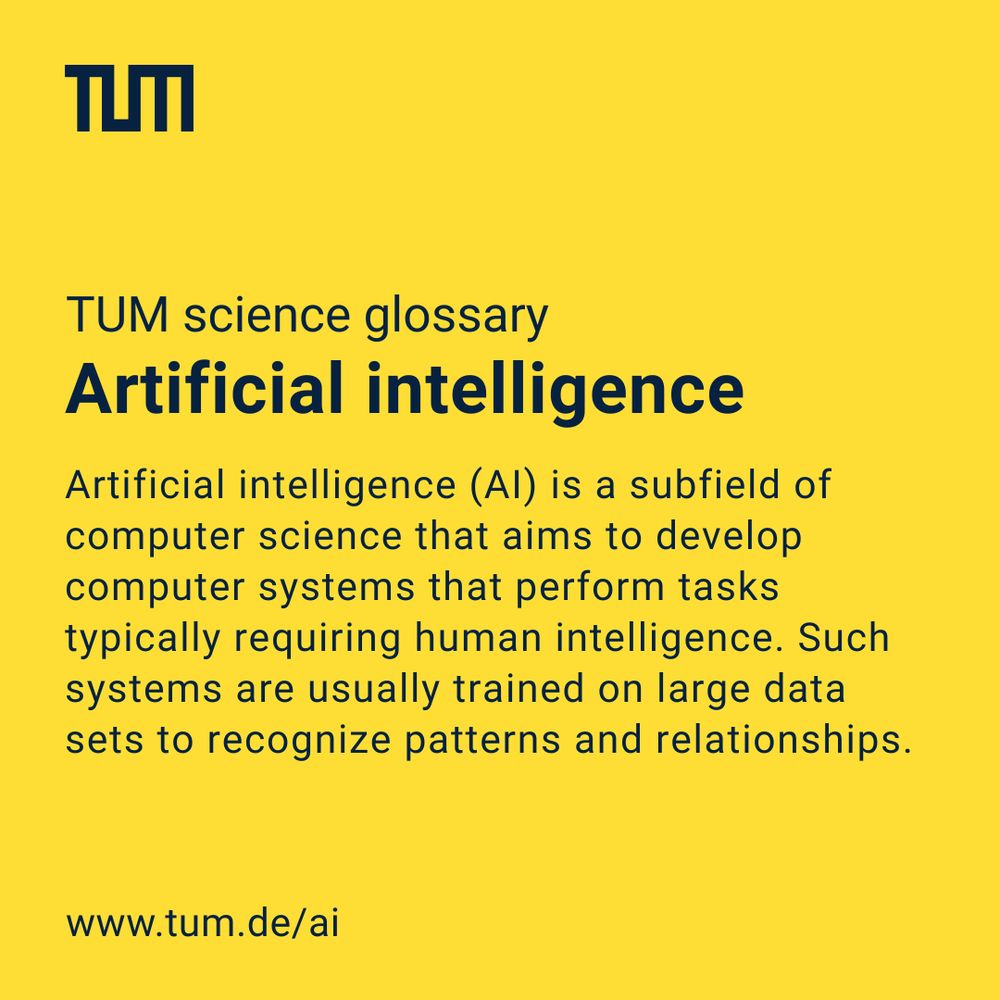
June 12, 2025 at 9:11 AM
Our #ScienceGlossary enters its next round – this time focusing on #ArtificialIntelligence. We explain key concepts that shape the AI debate in science and society, starting with the term #AI itself: go.tum.de/312381
#AIExplained
@researchinbavaria.bsky.social
📷TUM CCC
#AIExplained
@researchinbavaria.bsky.social
📷TUM CCC
Let’s take a closer look at our next #scienceglossary term for the research field #energy: “catalysis". #Catalysts can be metals, chemical compounds, or enzymes — they speed up reactions without being used up: go.tum.de/917142
📷TUM CCC/ T. Hamacher
📷TUM CCC/ T. Hamacher

October 23, 2025 at 1:50 PM
Let’s take a closer look at our next #scienceglossary term for the research field #energy: “catalysis". #Catalysts can be metals, chemical compounds, or enzymes — they speed up reactions without being used up: go.tum.de/917142
📷TUM CCC/ T. Hamacher
📷TUM CCC/ T. Hamacher
What if #AI could see the world like we do?
That’s the idea behind #ComputerVision — machines interpreting visual data to navigate, detect, and decide. Our latest #ScienceGlossary entry explains how it works: go.tum.de/312381
📷TUM CCC/ R. Heckel, TUM CIT
That’s the idea behind #ComputerVision — machines interpreting visual data to navigate, detect, and decide. Our latest #ScienceGlossary entry explains how it works: go.tum.de/312381
📷TUM CCC/ R. Heckel, TUM CIT

July 17, 2025 at 9:58 AM
What if #AI could see the world like we do?
That’s the idea behind #ComputerVision — machines interpreting visual data to navigate, detect, and decide. Our latest #ScienceGlossary entry explains how it works: go.tum.de/312381
📷TUM CCC/ R. Heckel, TUM CIT
That’s the idea behind #ComputerVision — machines interpreting visual data to navigate, detect, and decide. Our latest #ScienceGlossary entry explains how it works: go.tum.de/312381
📷TUM CCC/ R. Heckel, TUM CIT
Breaking down complex terms – and making it understandable for everyone: that’s what we aim to do with our new #ScienceGlossary. In keeping with the #QuantumYear2025, let's explore the world of quantum, starting with the term #Quantum: go.tum.de/895011
@researchinbavaria.bsky.social
📷TUM CCC
@researchinbavaria.bsky.social
📷TUM CCC
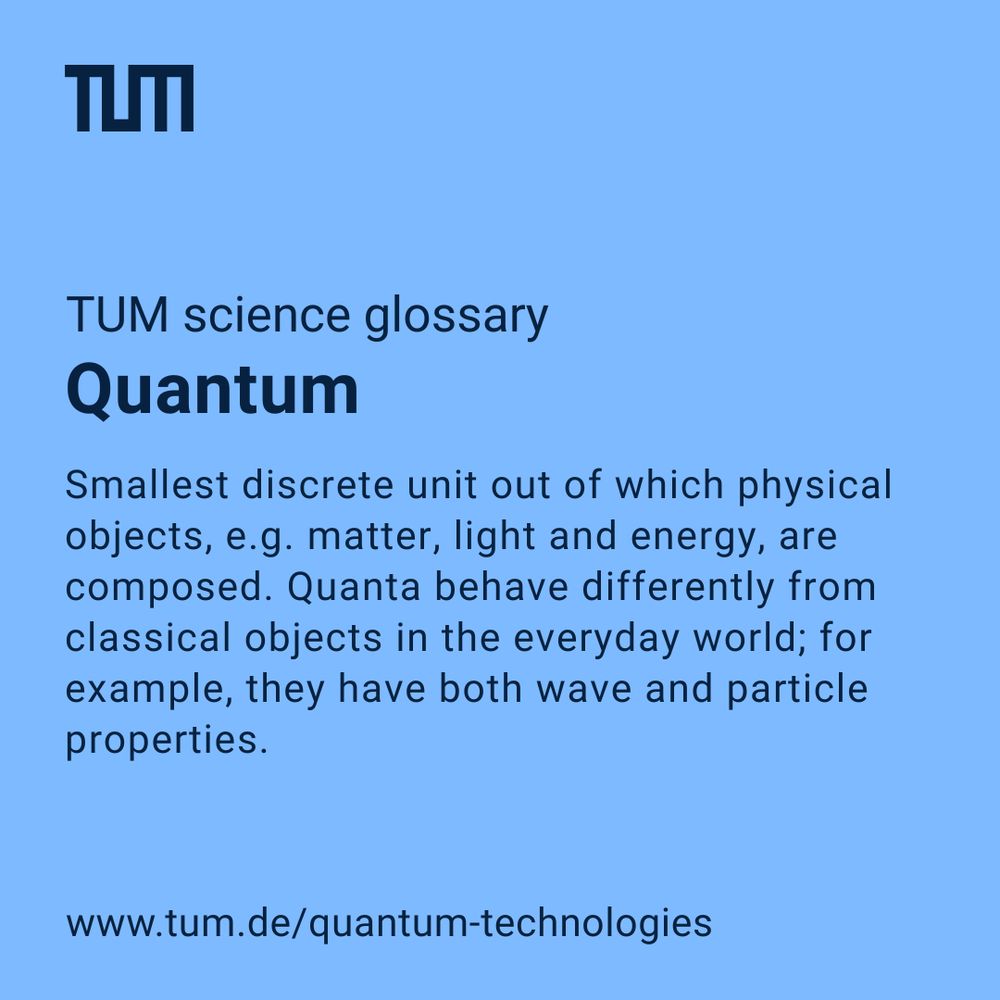
April 8, 2025 at 10:56 AM
Breaking down complex terms – and making it understandable for everyone: that’s what we aim to do with our new #ScienceGlossary. In keeping with the #QuantumYear2025, let's explore the world of quantum, starting with the term #Quantum: go.tum.de/895011
@researchinbavaria.bsky.social
📷TUM CCC
@researchinbavaria.bsky.social
📷TUM CCC
In our #scienceglossary for the research field #energy, today’s term is "sector coupling". #Energysectors are the different areas of the economy where energy is produced, converted, distributed, and used: go.tum.de/917142
📷TUM CCC/ T. Hamacher
📷TUM CCC/ T. Hamacher

October 16, 2025 at 8:35 AM
In our #scienceglossary for the research field #energy, today’s term is "sector coupling". #Energysectors are the different areas of the economy where energy is produced, converted, distributed, and used: go.tum.de/917142
📷TUM CCC/ T. Hamacher
📷TUM CCC/ T. Hamacher
On #WorldQuantumDay – held every year on April 14 to increase the visibility of #QuantumScience worldwide – our latest #ScienceGlossary entry features the term #QuantumComputer: go.tum.de/239519
@researchinbavaria.bsky.social
📷TUM CCC
@researchinbavaria.bsky.social
📷TUM CCC

April 14, 2025 at 8:48 AM
On #WorldQuantumDay – held every year on April 14 to increase the visibility of #QuantumScience worldwide – our latest #ScienceGlossary entry features the term #QuantumComputer: go.tum.de/239519
@researchinbavaria.bsky.social
📷TUM CCC
@researchinbavaria.bsky.social
📷TUM CCC
Have you ever heard of #qubits? These units of information are a fundamental concept in #QuantumScience – and the next entry in our #ScienceGlossary. As part of #QuantumYear2025, we're breaking down key terms, one step at a time: go.tum.de/239519
📷TUM CCC
📷TUM CCC
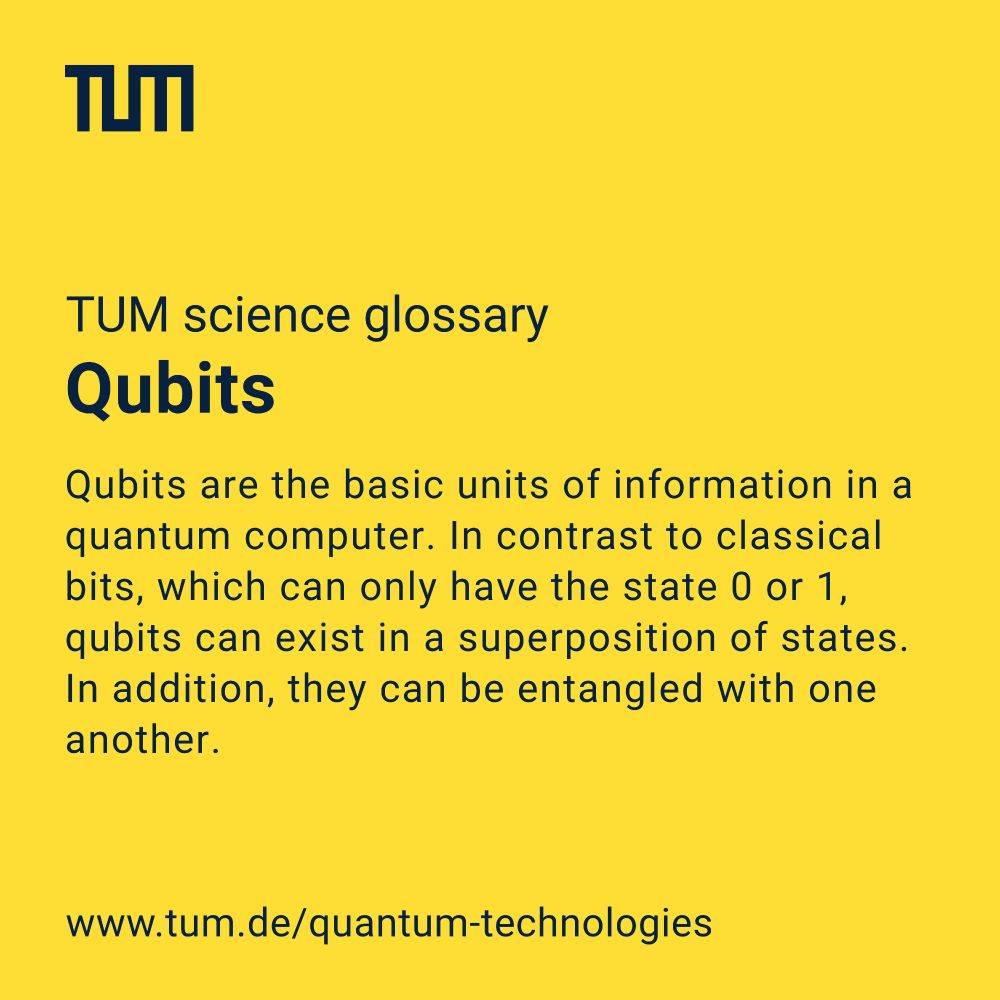
April 22, 2025 at 9:36 AM
Have you ever heard of #qubits? These units of information are a fundamental concept in #QuantumScience – and the next entry in our #ScienceGlossary. As part of #QuantumYear2025, we're breaking down key terms, one step at a time: go.tum.de/239519
📷TUM CCC
📷TUM CCC
Energy is convertible and can occur in different forms. Next up in our #scienceglossary is the term #energyconversion, which takes place, for example, in #batteries or large-scale #generators: go.tum.de/917142
📷TUM CCC/ T. Hamacher
📷TUM CCC/ T. Hamacher

October 1, 2025 at 11:33 AM
Energy is convertible and can occur in different forms. Next up in our #scienceglossary is the term #energyconversion, which takes place, for example, in #batteries or large-scale #generators: go.tum.de/917142
📷TUM CCC/ T. Hamacher
📷TUM CCC/ T. Hamacher
Our #ScienceGlossary expands with an essential #AI concept. #DigitalTwins bridge the physical & virtual world and help us model and manage complex systems in real time, like smart factories or urban planning: go.tum.de/312381
📷TUM CCC/ R. Heckel, TUM CIT
📷TUM CCC/ R. Heckel, TUM CIT

August 5, 2025 at 12:37 PM
Our #ScienceGlossary expands with an essential #AI concept. #DigitalTwins bridge the physical & virtual world and help us model and manage complex systems in real time, like smart factories or urban planning: go.tum.de/312381
📷TUM CCC/ R. Heckel, TUM CIT
📷TUM CCC/ R. Heckel, TUM CIT
Our #scienceglossary continues – with a new entry on #AIsystems that you most likely have used before: #LargeLanguageModels generate and understand language by predicting the next word: go.tum.de/312381
#MachineLearning
📷TUM CCC/Prof. R. Heckel, TUM CIT
#MachineLearning
📷TUM CCC/Prof. R. Heckel, TUM CIT

June 26, 2025 at 8:20 AM
Our #scienceglossary continues – with a new entry on #AIsystems that you most likely have used before: #LargeLanguageModels generate and understand language by predicting the next word: go.tum.de/312381
#MachineLearning
📷TUM CCC/Prof. R. Heckel, TUM CIT
#MachineLearning
📷TUM CCC/Prof. R. Heckel, TUM CIT
Our #scienceglossary continues with the next #energy key term: #fossilfuels. They remain central to today’s #energysupply, while at the same time representing one of the main challenges for achieving #climateneutrality: go.tum.de/917142
📷TUM CCC/ T. Hamacher
📷TUM CCC/ T. Hamacher

September 24, 2025 at 12:04 PM
Our #scienceglossary continues with the next #energy key term: #fossilfuels. They remain central to today’s #energysupply, while at the same time representing one of the main challenges for achieving #climateneutrality: go.tum.de/917142
📷TUM CCC/ T. Hamacher
📷TUM CCC/ T. Hamacher
Two particles, one shared state – no matter the distance. That’s #QuantumEntanglement, one of the building blocks of #QuantumTech, and also the next entry in our #ScienceGlossary: go.tum.de/895011
#Quantum2025
@researchinbavaria.bsky.social
📷 TUM CCC
#Quantum2025
@researchinbavaria.bsky.social
📷 TUM CCC
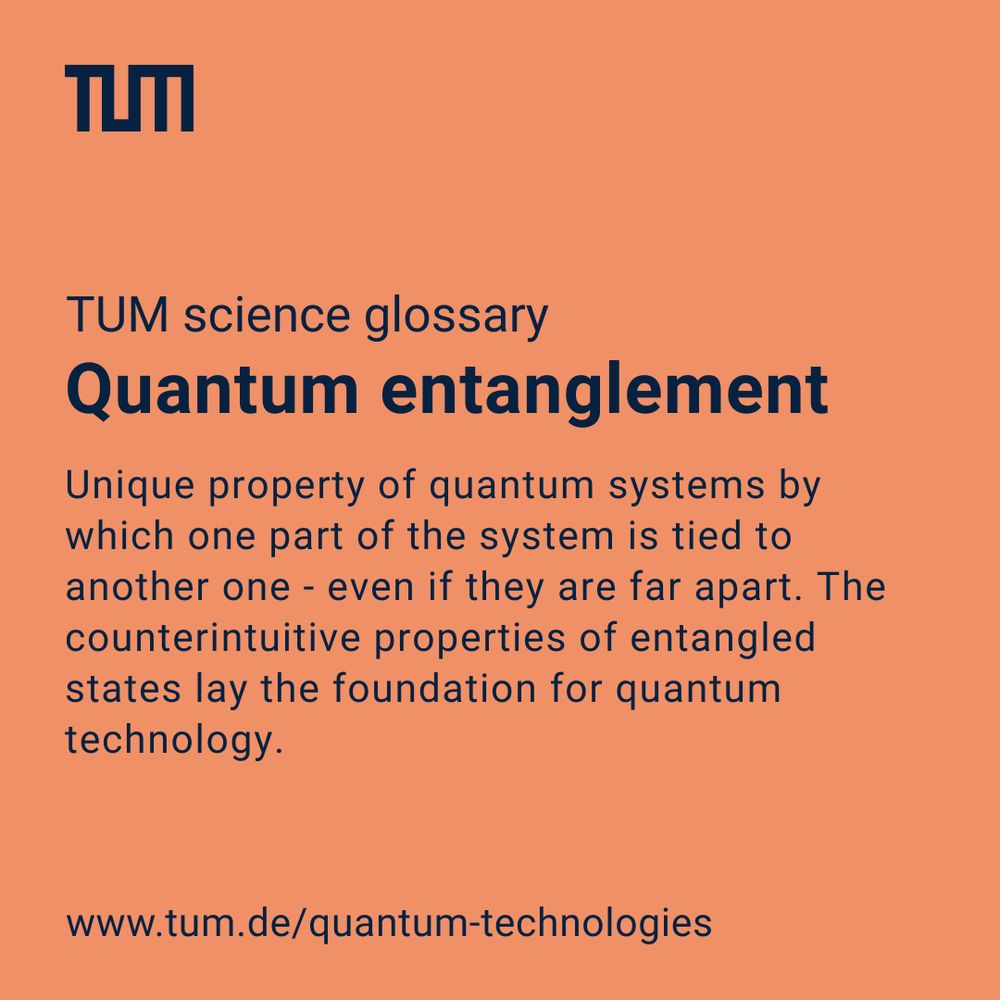
April 29, 2025 at 9:18 AM
Two particles, one shared state – no matter the distance. That’s #QuantumEntanglement, one of the building blocks of #QuantumTech, and also the next entry in our #ScienceGlossary: go.tum.de/895011
#Quantum2025
@researchinbavaria.bsky.social
📷 TUM CCC
#Quantum2025
@researchinbavaria.bsky.social
📷 TUM CCC
Our #ScienceGlossary kicks off again – this time all about #energy. We start with #RenewableEnergies, which are key to building a #sustainable future by reducing dependence on fossil fuels and driving climate-friendly technologies: go.tum.de/917142
📷TUM CCC/ T. Hamacher
📷TUM CCC/ T. Hamacher
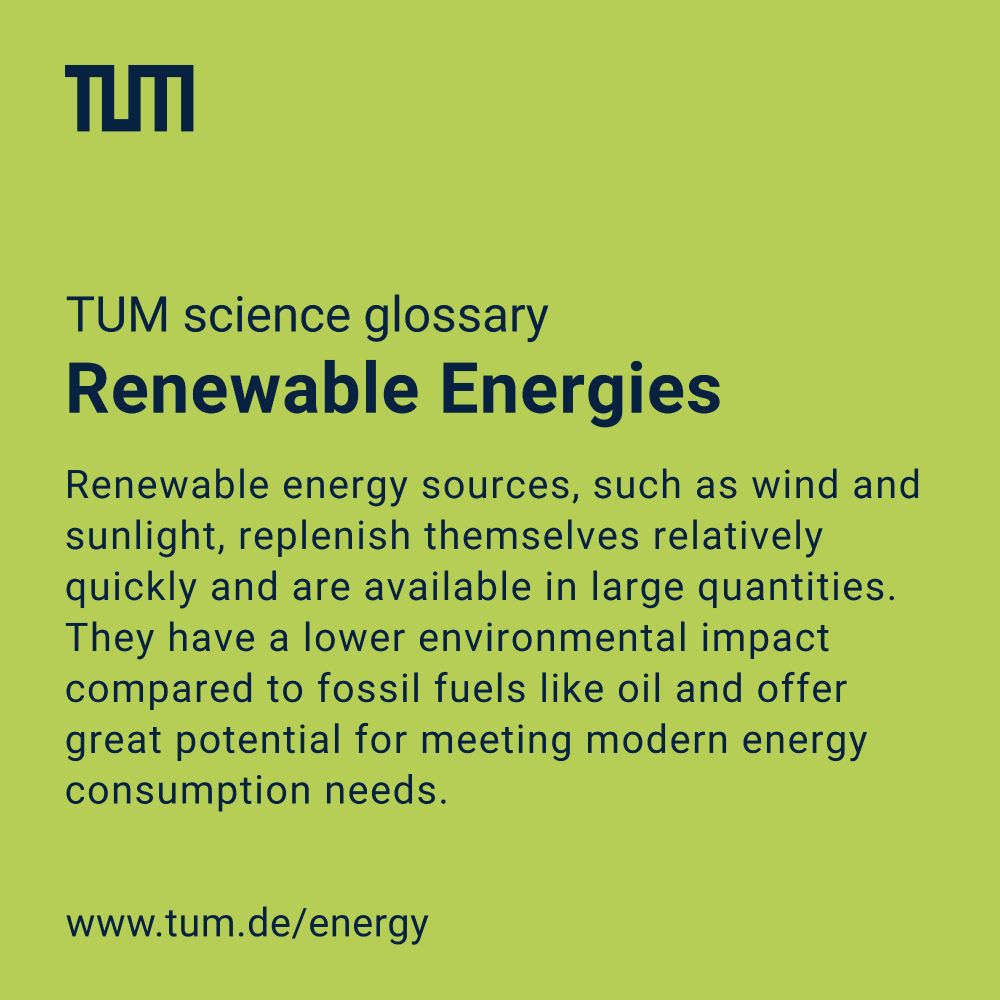
September 18, 2025 at 1:08 PM
Our #ScienceGlossary kicks off again – this time all about #energy. We start with #RenewableEnergies, which are key to building a #sustainable future by reducing dependence on fossil fuels and driving climate-friendly technologies: go.tum.de/917142
📷TUM CCC/ T. Hamacher
📷TUM CCC/ T. Hamacher
The #InternetOfThings (#IoT) is the latest entry in our #ScienceGlossary. Connected devices are transforming how we live and work—from #SmartHomes to #AutonomousSystems: go.tum.de/312381
#AI
📷TUM CCC/Prof. R. Heckel, TUM CIT
#AI
📷TUM CCC/Prof. R. Heckel, TUM CIT

July 8, 2025 at 9:41 AM
The #InternetOfThings (#IoT) is the latest entry in our #ScienceGlossary. Connected devices are transforming how we live and work—from #SmartHomes to #AutonomousSystems: go.tum.de/312381
#AI
📷TUM CCC/Prof. R. Heckel, TUM CIT
#AI
📷TUM CCC/Prof. R. Heckel, TUM CIT

